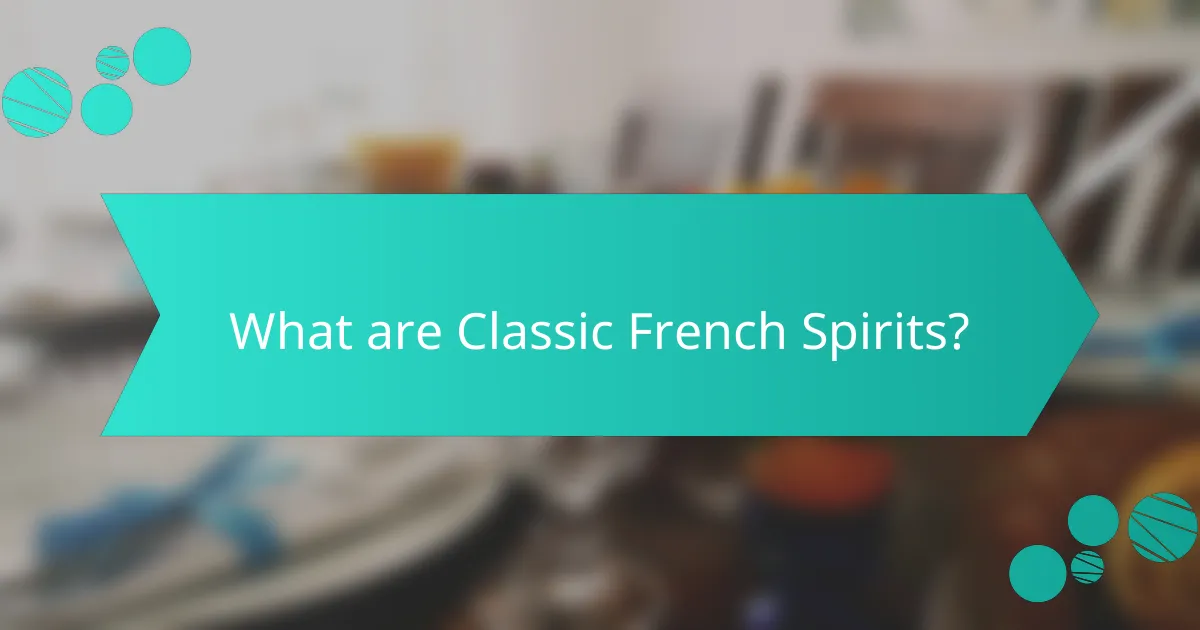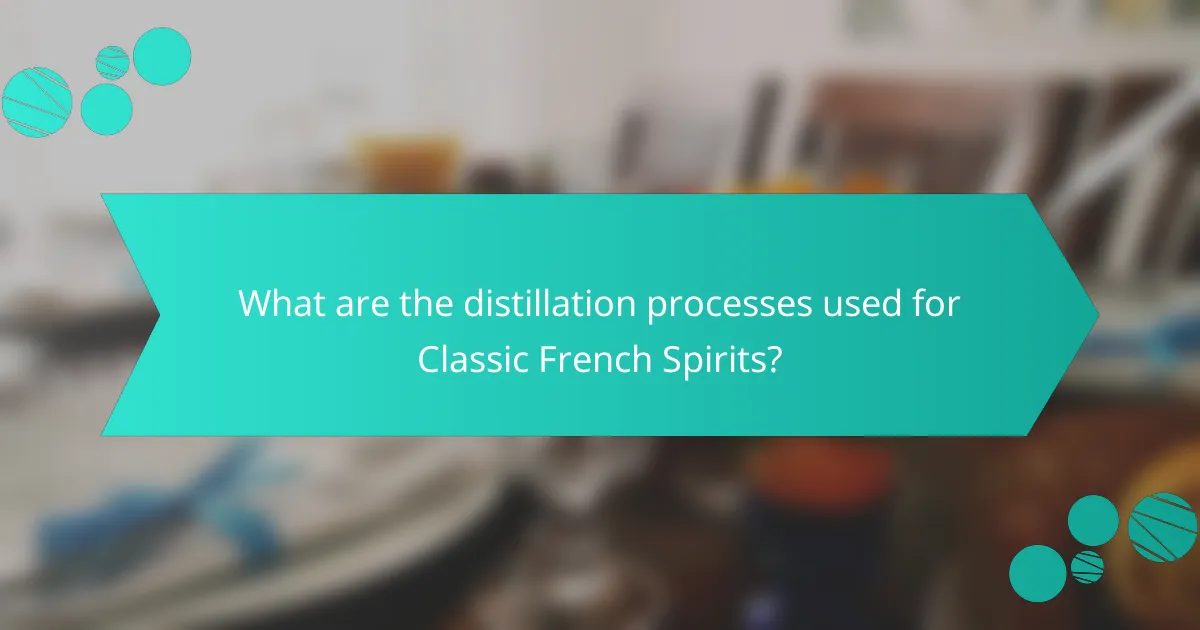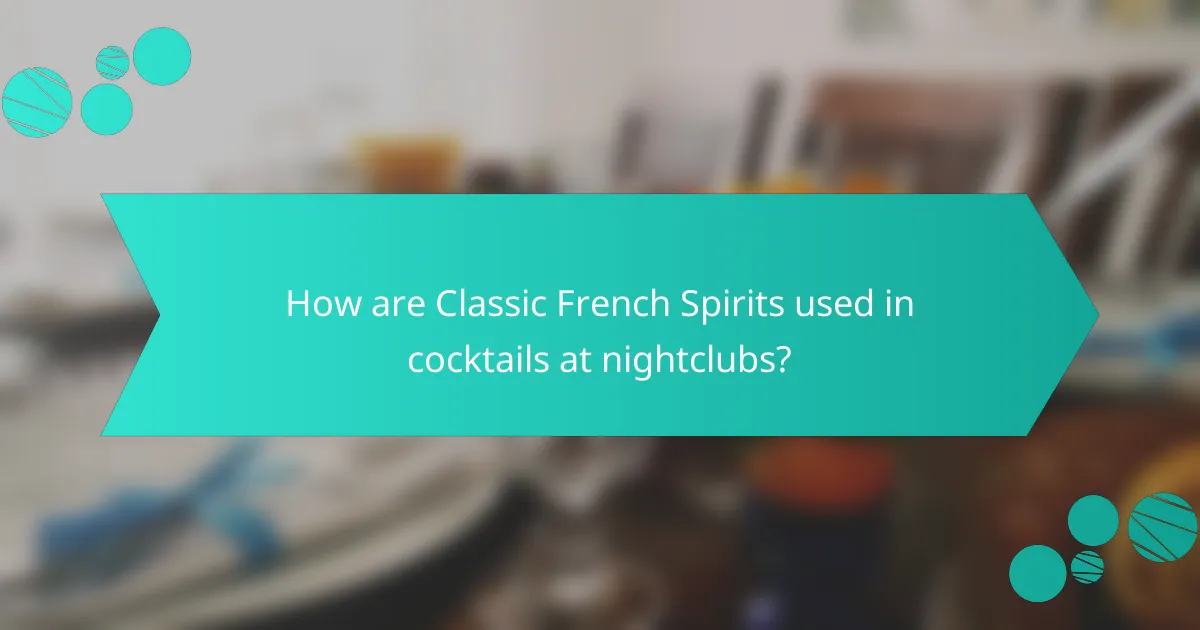Classic French spirits are distilled alcoholic beverages from France, including well-known types such as Cognac, Armagnac, and absinthe. Cognac is a brandy made from specific grape varieties in the Cognac region, while Armagnac is produced in Gascony using different distillation methods. Absinthe is a high-alcohol spirit flavored with herbs, notably wormwood. The article explores the distillation processes of these spirits, including pot still and column still distillation, and highlights their strict production regulations. Additionally, it discusses the role of classic French spirits in cocktails, particularly in nightclubs, emphasizing their unique flavors and applications in signature drinks.

What are Classic French Spirits?
Classic French spirits are distilled alcoholic beverages originating from France. They include well-known types such as Cognac, Armagnac, and absinthe. Cognac is a type of brandy made from specific grape varieties in the Cognac region. Armagnac is also a brandy but is produced using different distillation methods in Gascony. Absinthe is a highly alcoholic spirit flavored with herbs, particularly wormwood. These spirits have rich histories and are often enjoyed in cocktails or neat. The production of these spirits adheres to strict regulations, ensuring quality and authenticity. For example, Cognac must be aged for a minimum of two years in oak barrels.
How are Classic French Spirits categorized?
Classic French spirits are categorized primarily into three main types: brandy, liqueurs, and absinthe. Brandy includes subcategories like Cognac and Armagnac, which are both distilled from grapes. Liqueurs are sweetened spirits infused with fruits, herbs, or spices, with examples such as Grand Marnier and Cointreau. Absinthe is a highly alcoholic spirit flavored with botanicals, primarily wormwood. Each category has distinct production methods and flavor profiles. The classification reflects traditional French distillation practices and regional regulations. For instance, Cognac must adhere to strict guidelines set by the Appellation d’Origine Contrôlée (AOC).
What are the main types of Classic French Spirits?
The main types of Classic French Spirits are Cognac, Armagnac, Calvados, and Pastis. Cognac is a type of brandy produced in the Cognac region. It is made from white grapes and aged in oak barrels. Armagnac is another type of brandy, distinct for its traditional distillation methods. It is produced in the Gascony region and often has a more robust flavor than Cognac. Calvados is an apple brandy from the Normandy region. It is made from fermented apple juice and can be aged for several years. Pastis is an anise-flavored spirit that is typically diluted with water before drinking. Each of these spirits has a unique production process and flavor profile, contributing to their classic status in French culture.
What defines each type of Classic French Spirit?
Classic French spirits are defined by their unique production methods and flavor profiles. Each type includes distinct characteristics that set them apart.
Cognac is a type of brandy made from specific grape varieties. It undergoes double distillation in copper pot stills. Cognac must be aged in oak barrels for a minimum of two years.
Armagnac is another form of brandy, produced in the Gascony region. It is typically distilled using column stills. Armagnac is known for its richer, more robust flavor. It is often aged longer than Cognac.
Absinthe is a highly alcoholic spirit flavored with herbs, including wormwood. It is traditionally distilled and can have an anise flavor profile. Absinthe was banned in many countries for years, but it has seen a resurgence.
Calvados is an apple brandy from the Normandy region. It is made from fermented apple juice and is distilled in pot stills. Calvados can be aged for several years, enhancing its complexity.
Pastis is an anise-flavored spirit that is often diluted with water. It is a popular aperitif in France. Pastis is known for its sweet and aromatic profile.
Each classic French spirit has distinct attributes that contribute to its identity. These characteristics are rooted in traditional production methods and regional ingredients.
Why are Classic French Spirits significant in the beverage industry?
Classic French spirits are significant in the beverage industry due to their rich heritage and diverse production methods. They represent centuries of craftsmanship and tradition. Renowned types include Cognac, Armagnac, and Calvados. These spirits are often made using specific regional grapes or apples. The distillation processes vary, influencing flavor profiles and quality. Cognac, for example, undergoes double distillation in copper pot stills. This method enhances its complexity and smoothness. French spirits also play a vital role in cocktail culture. They are foundational ingredients in many classic cocktails. Their unique flavors elevate the overall drinking experience.
What cultural impact do Classic French Spirits have?
Classic French spirits significantly influence global culture and gastronomy. They embody centuries of tradition and craftsmanship in distillation. Spirits like Cognac and Armagnac have shaped social rituals in France and beyond. Their production methods are recognized by UNESCO as part of the cultural heritage of France. Classic French spirits are often featured in culinary pairings, enhancing fine dining experiences. They also play a vital role in cocktail culture, inspiring mixologists worldwide. The popularity of these spirits has led to an increase in French-themed bars and restaurants globally. This cultural impact highlights the importance of Classic French spirits in both social and culinary contexts.
How do Classic French Spirits influence cocktail trends?
Classic French spirits significantly influence cocktail trends by introducing unique flavors and traditional techniques. These spirits, such as cognac, absinthe, and armagnac, offer distinct profiles that enhance cocktail complexity. Bartenders often incorporate these spirits to elevate classic recipes or create innovative mixes. For example, cognac’s rich, fruity notes are increasingly featured in modern cocktails. Absinthe’s herbal qualities are used to add depth and intrigue to drinks. The resurgence of craft cocktails has led to a renewed interest in these spirits. Trends show a preference for high-quality, artisanal products, aligning with the characteristics of classic French spirits. This influence is evident in cocktail menus across upscale bars and nightclubs.

What are the distillation processes used for Classic French Spirits?
Classic French spirits primarily use two distillation processes: pot still distillation and column still distillation. Pot still distillation is traditional and often used for spirits like Cognac and Armagnac. This method involves heating the fermented mash in a pot still, allowing for a more flavorful and aromatic spirit. Column still distillation, also known as continuous distillation, is commonly used for producing lighter spirits like some types of brandy. This method allows for higher alcohol content and a more neutral flavor profile. Both processes are regulated by French laws to ensure quality and authenticity in the production of these spirits.
How does the distillation process vary among different types?
The distillation process varies significantly among different types of spirits. For instance, pot still distillation is often used for making whisky and rum. This method allows for a slower distillation, resulting in richer flavors. Column still distillation, on the other hand, is commonly used for vodka and gin. This continuous process produces a higher alcohol content and a cleaner taste.
Additionally, the distillation temperature can differ. Lower temperatures are typically used for delicate spirits like gin to preserve botanical flavors. Conversely, higher temperatures may be employed for robust spirits like brandy to extract more flavor compounds.
The number of distillation runs also varies. Some spirits, such as Scotch whisky, may undergo a single distillation, while others like vodka may be distilled multiple times for purity. Each method impacts the final flavor profile and quality of the spirit produced.
What equipment is essential for distilling Classic French Spirits?
Essential equipment for distilling Classic French Spirits includes a pot still, fermentation vessels, and a heat source. A pot still is crucial for the distillation process, allowing for the separation of alcohol from the mash. Fermentation vessels are needed to convert sugars into alcohol through yeast activity. A reliable heat source is necessary to maintain the temperature during distillation. Additionally, a hydrometer is used to measure alcohol content. Collecting vessels are required to gather the distilled spirit. These pieces of equipment are standard in traditional French distillation practices.
What are the specific steps in the distillation process?
The distillation process involves several specific steps. First, a fermentation process converts sugars into alcohol. Second, the mixture is heated in a still. Third, the alcohol vapor rises and separates from the liquid. Fourth, the vapor is cooled and condensed back into liquid form. Fifth, the distillate is collected. Finally, the distillation may be repeated for higher purity. This method is essential in producing classic French spirits, ensuring the desired flavor and alcohol content.
What role does aging play in the quality of Classic French Spirits?
Aging significantly enhances the quality of Classic French Spirits. It allows for the development of complex flavors and aromas. During aging, spirits interact with the wood of the barrels. This interaction extracts compounds such as vanillin and tannins. These compounds contribute to the spirit’s flavor profile. Aging also smooths out harsh alcohol notes. The duration of aging varies by spirit type. For example, Cognac is often aged for a minimum of two years. Research indicates that longer aging typically results in higher quality. This is evidenced by the classification system for Cognac and Armagnac, which rewards longer aging with superior designations.
How does aging affect flavor profiles?
Aging significantly alters flavor profiles in spirits. During aging, chemical reactions occur between the spirit and the wood of the barrel. These reactions infuse the spirit with complex flavors such as vanilla, caramel, and spices. The wood also contributes tannins, which enhance mouthfeel and structure. Additionally, evaporation during aging concentrates flavors and aromas. The duration of aging impacts the intensity of these flavors. For example, longer aging typically results in richer, more nuanced profiles. Research indicates that spirits aged for at least three years develop distinct characteristics compared to unaged counterparts. This process is essential in defining the quality and appeal of classic French spirits.
What are the common aging techniques used?
Common aging techniques used in classic French spirits include barrel aging, solera aging, and oxidative aging. Barrel aging involves storing spirits in wooden casks, which imparts flavor and color. Solera aging is a fractional blending process that mixes different ages of spirits, ensuring consistency. Oxidative aging occurs in open containers, allowing exposure to air, which enhances complexity. Each technique influences the final product’s flavor profile and character. Barrel aging is particularly notable in Cognac production, where the type of wood affects the spirit’s taste.

How are Classic French Spirits used in cocktails at nightclubs?
Classic French spirits are integral to cocktails in nightclubs. These spirits include cognac, absinthe, and pastis. They are often used for their unique flavors and aromas. Cocktails like the Sazerac feature absinthe as a key ingredient. Cognac is commonly used in drinks like the French 75. Pastis is popular for refreshing cocktails served with water. Nightclubs utilize these spirits to create signature drinks. Their premium quality enhances the overall drinking experience.
What are popular cocktails that feature Classic French Spirits?
Popular cocktails that feature Classic French Spirits include the French 75, Sidecar, and Kir Royale. The French 75 combines gin, champagne, lemon juice, and sugar. Sidecar consists of cognac, orange liqueur, and lemon juice. Kir Royale is made with crème de cassis and champagne. Each cocktail showcases the unique flavors of French spirits. The French 75 is known for its refreshing taste and celebratory nature. Sidecar offers a balanced, citrusy profile. Kir Royale is a classic aperitif enjoyed in social settings. These cocktails highlight the versatility of Classic French Spirits in mixology.
How do bartenders incorporate Classic French Spirits into their menus?
Bartenders incorporate Classic French Spirits into their menus by creating signature cocktails that highlight these spirits. Popular spirits include Cognac, Armagnac, and Absinthe. They often use these spirits as base ingredients in classic cocktails like the Sidecar and Sazerac. Bartenders may also craft unique drinks that blend these spirits with fresh ingredients. Seasonal ingredients and local produce often enhance the flavor profiles of these cocktails. Additionally, bartenders educate customers about the heritage and tasting notes of the spirits. This approach fosters appreciation for the complexity of Classic French Spirits. Notably, the global cocktail culture has embraced these spirits, increasing their popularity in bars and nightclubs.
What techniques enhance the presentation of cocktails with Classic French Spirits?
Techniques that enhance the presentation of cocktails with Classic French Spirits include garnishing, glassware selection, and layering. Garnishing with fresh herbs or citrus peels adds visual appeal and aroma. Using elegant glassware, such as coupe or highball glasses, elevates the overall experience. Layering ingredients creates a striking visual effect, showcasing the colors of the spirits. Rimmed glasses with sugar or salt can also enhance the aesthetic and flavor. Additionally, employing ice shapes, like spheres or cubes, can maintain temperature while adding sophistication. These techniques collectively improve the cocktail’s presentation and enjoyment.
What trends are emerging in the use of Classic French Spirits in nightlife?
Emerging trends in the use of Classic French Spirits in nightlife include a resurgence in cocktail culture. Bartenders are increasingly incorporating these spirits into innovative cocktail recipes. Classic French spirits such as Cognac and Absinthe are gaining popularity for their unique flavors. Additionally, there is a growing interest in craft cocktails that highlight the quality of these spirits. This trend is supported by consumer demand for premium and artisanal beverages. Events and tastings focused on French spirits are becoming common in nightlife venues. Moreover, social media influences the promotion of these spirits through visually appealing presentations. Overall, Classic French Spirits are becoming a staple in modern cocktail menus.
How are consumers’ preferences changing regarding Classic French Spirits?
Consumers’ preferences regarding Classic French Spirits are shifting towards premium and artisanal options. There is an increasing interest in high-quality ingredients and traditional production methods. This trend reflects a broader movement towards authenticity in food and beverage choices. Younger consumers are particularly drawn to unique flavor profiles and craft spirits. According to a 2022 market report, sales of premium spirits have risen by 15% annually. Additionally, social media influences consumer choices, promoting brands that emphasize heritage and craftsmanship. This shift indicates a growing appreciation for the cultural significance of Classic French Spirits.
What innovative cocktails are being created with Classic French Spirits?
Innovative cocktails created with Classic French Spirits include variations like the French 75, which combines gin, champagne, and lemon juice. Another popular cocktail is the Sidecar, made with cognac, orange liqueur, and lemon juice. The French Martini features vodka, raspberry liqueur, and pineapple juice, showcasing a fruity twist. Additionally, the Kir Royale, made with crème de cassis and champagne, is a classic aperitif. Many bartenders experiment by infusing these spirits with herbs and spices, creating unique flavor profiles. These cocktails highlight the versatility of Classic French Spirits in modern mixology.
What tips can enhance the experience of enjoying Classic French Spirits in nightclubs?
To enhance the experience of enjoying Classic French Spirits in nightclubs, consider the following tips. Choose a high-quality brand known for its craftsmanship. Opt for spirits served at the appropriate temperature to enhance flavors. Pair the spirits with complementary mixers or garnishes for an elevated taste. Engage with knowledgeable bartenders to learn about the spirits’ origins and characteristics. Enjoy the ambiance of the nightclub, as the environment can influence your tasting experience. Participate in tasting events or themed nights focused on Classic French Spirits for deeper appreciation. Lastly, savor the spirits slowly to fully enjoy their complex profiles.
Classic French spirits are distilled alcoholic beverages from France, including Cognac, Armagnac, absinthe, Calvados, and Pastis. The article covers their categorization, production methods, and aging processes, highlighting the significance of these spirits in the beverage industry and their cultural impact. It also explores how classic French spirits are incorporated into cocktails, the emerging trends in nightlife, and tips for enhancing the experience of enjoying these spirits in nightclubs. Key topics include distillation techniques, flavor profiles, and innovative cocktail creations that showcase the versatility of classic French spirits.